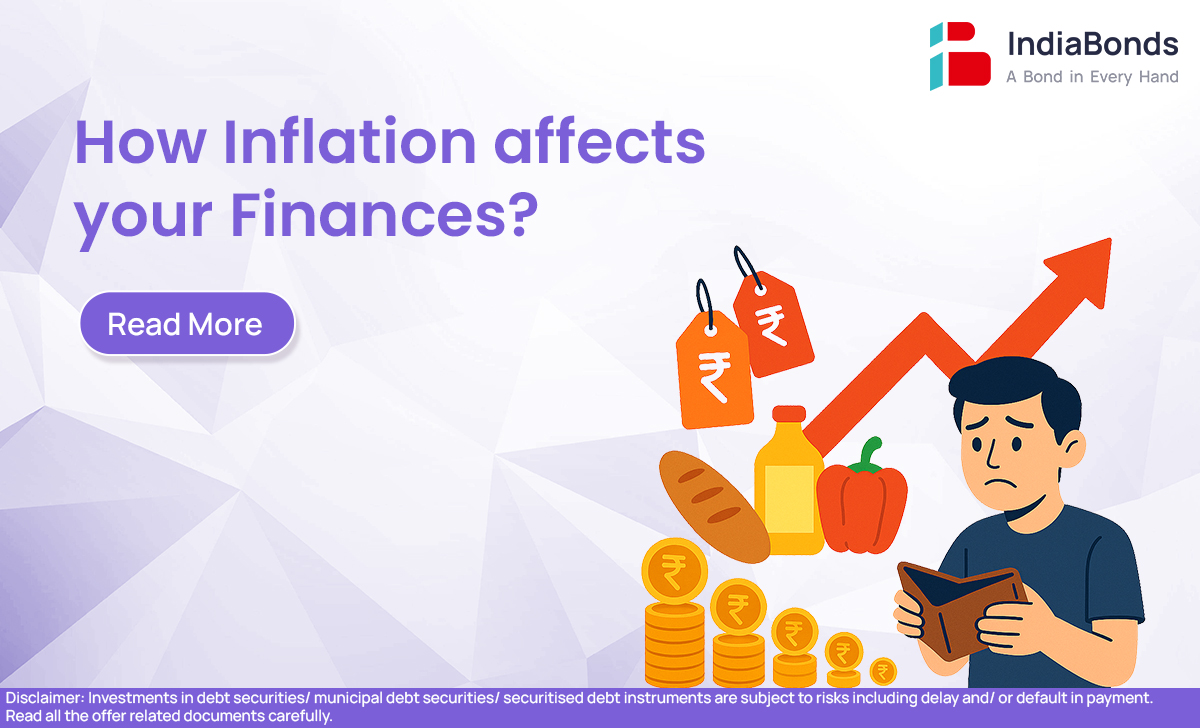How inflation affects your finances

Introduction
Let me tell you something my father once said over a cup of tea — “Beta, paisa bank mein soya toh mehnga ho jaata hai.” At that time, I laughed, but he was right.
Take this example: Last year, my friend Meena saved up to buy a scooter for ₹1,00,000. She thought she’d wait a few months to buy it. When she finally went to the showroom this year, the price tag said ₹1,05,000. Same scooter. Same model. Just more expensive.
That’s inflation. It’s like a sneaky houseguest who doesn’t take your cash directly but makes sure that every month, your money buys a little less than before.
How Inflation Affects Personal Finance
Here’s the thing — inflation isn’t just about price hikes. It’s about how it messes with your whole money game without you even noticing.
- Everyday costs creep up – That ₹50 milk packet? ₹65 now. The auto fare you paid ₹30 for? Now ₹40. And don’t even get me started on onions — one year they’re cheap, the next they’re priced like gold.
- Your ₹500 feels smaller – You head to the market with ₹500 thinking you’ll buy groceries for the week. By the time you’ve picked up vegetables, rice, and a packet of biscuits, your wallet is empty.
- Savings quietly lose value – If your savings account gives you 3% interest but inflation is 6%, you’re not really earning — you’re falling behind. Your bank statement might look healthy, but in reality, that money buys less every year.
- Loans can pinch harder – When inflation rises, interest rates often go up too. That means your home loan EMI or personal loan repayment might suddenly start eating a bigger chunk of your salary.
How does inflation affect your savings?
Think of it like running on a treadmill. You’re moving, sweating, working hard — but you’re not actually going anywhere. That’s what happens when your money grows slower than prices rise.
Impact on Retirement Planning
This is where inflation can really catch people off guard.
People often think, “If I have ₹1 crore saved, I’ll be comfortable after retirement.” But here’s the twist — if inflation is 6%, what costs ₹50,000 a month today will cost almost ₹90,000 in 10 years. That “comfortable” cushion suddenly feels thin.
Why? Because:
- Medical bills don’t just rise — they sprint.
- Groceries, electricity, and basic services keep eating more of your monthly budget.
- Fixed incomes like pensions often don’t adjust enough to cover rising costs.
How to plan for inflation in retirement:
- Don’t let all your money just sit in low-interest savings.
- Put some of it into investments that can beat inflation — equity mutual funds, inflation-linked bonds, or a mix of fixed and growth options.
- Check your plan every few years — don’t assume what works today will work 15 years later.
Conclusion
Inflation is like that slow leak in a tyre. You can keep driving for a while, but one day, you’ll feel the impact.
You can’t stop prices from rising — no one can — but you can prepare for it. The goal is simple: make sure your money grows faster than prices. That way, whether you’re buying your child’s first cycle, planning their college, or just dreaming of a peaceful retirement, inflation won’t be the reason you have to cut corners.
FAQ
1. How does inflation affect personal finances?
It increases your daily expenses, reduces the real worth of your savings, and can make loans and future plans more expensive.
2. What are the five effects of inflation?
Higher living costs, weaker purchasing power, increased loan interest rates, reduced savings value, and costlier borrowing.
3. How does inflation affect your money over time?
Your money loses buying power — meaning you’ll need more rupees to buy the same things in the future.
4. How is inflation related to the financial system?
Inflation impacts interest rates, lending, and investments. In India, the RBI uses policies to keep inflation in check and maintain balance in the economy.
Disclaimer : Investments in debt securities/ municipal debt securities/ securitised debt instruments are subject to risks including delay and/ or default in payment. Read all the offer related documents carefully.


















